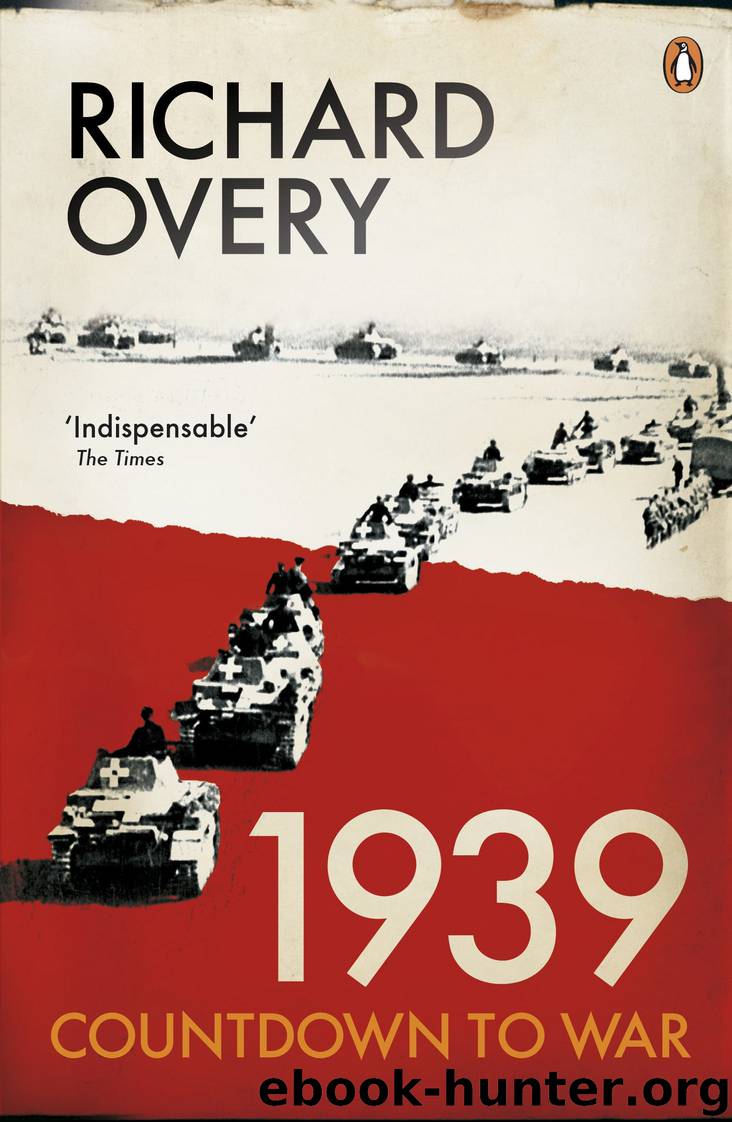1939 by Richard Overy

Author:Richard Overy
Language: eng
Format: epub
Publisher: Penguin Group USA, Inc.
Published: 2010-11-28T16:00:00+00:00
The reply, I think, to Italy shd be that we have already told Germany that she must immediately withdraw her troops from Poland if we are not to come to the assistance of Poland, and by that condition we stand. We could not contemplate urging Poland to agree to a Conference with German troops still on Polish soil.38
After further phone calls to Bonnet, who pressed the idea of the conference forcefully on his British counterpart, Halifax finally rang Ciano at 6.38 in the evening to tell him that German withdrawal was a requirement, as was the restoration of Danzig’s status as a free city. Ciano finally let it be known at 9.30 that he and Mussolini had abandoned the idea altogether. ‘It seems to me that nothing else is to be done,’ wrote Ciano later in his diary. ‘It is not our business to give Hitler advice of this nature that he would reject with decisiveness, perhaps with contempt.’39 In Italy the realization that the coming war would not involve Italian participation in any form was welcomed with relief. Mussolini had to ban a peace demonstration in the Piazza Venezia, in the heart of Rome. ‘The usual pacifists,’ Mussolini complained.40 ‘One can continue to live,’ wrote the anti-fascist jurist Piero Calamandrei in his diary on 2 September, ‘one can continue to take walks in the woods, to paint, to sleep in one’s bed.’41 The following day Hitler sent Mussolini a letter thanking him for his intervention and explaining that no conference was possible that devalued the ‘blood sacrifice’ already made by German soldiers.42 On 5 September the Italian press finally published the news that Mussolini had heroically tried to intervene on the side of peace but had been frustrated by British intransigence : ‘The Duce,’ ran the headline, ‘has tried right to the very last moment to save the peace of Europe.’43
There is no doubt that the combination of Mussolini’s intervention, Bonnet’s pacifism and the uncertainty about French constitutional requirements created a situation of some confusion for Halifax and Chamberlain, who paid all these issues greater attention than they deserved. At the same time the anxiety generated by the failure to give a firm deadline for the ultimatum preyed on the patience of ministers, members of parliament and the public, who wanted an end to the tension. Unable to decide what should be broadcast that day, the BBC played gramophone records interrupted by occasional news bulletins.44 What followed during the late afternoon and evening was a government crisis quite out of proportion to the reality of the situation. At 4.30 in the afternoon the British cabinet met and asked for a firm deadline to be given. Halifax and Chamberlain insisted that the final decision still rested with the French, but as Halifax later put it, ‘the Cabinet itself was in an extremely difficult mood.’45 The chiefs of staff were present, and all insisted that an ultimatum must be given sooner rather than later. Hore-Belisha argued that if the Germans had
Download
This site does not store any files on its server. We only index and link to content provided by other sites. Please contact the content providers to delete copyright contents if any and email us, we'll remove relevant links or contents immediately.
| Belgium | France |
| Germany | Great Britain |
| Greenland | Italy |
| Netherlands | Romania |
| Scandinavia |
Room 212 by Kate Stewart(5119)
The Crown by Robert Lacey(4814)
Endurance: Shackleton's Incredible Voyage by Alfred Lansing(4780)
The Iron Duke by The Iron Duke(4354)
The Rape of Nanking by Iris Chang(4211)
Joan of Arc by Mary Gordon(4109)
Killing England by Bill O'Reilly(4001)
Say Nothing by Patrick Radden Keefe(3984)
I'll Give You the Sun by Jandy Nelson(3447)
Shadow of Night by Deborah Harkness(3367)
Hitler's Monsters by Eric Kurlander(3342)
Mary, Queen of Scots, and the Murder of Lord Darnley by Alison Weir(3210)
Blood and Sand by Alex Von Tunzelmann(3203)
Eleanor & Park by Rainbow Rowell(3172)
Darkest Hour by Anthony McCarten(3129)
Margaret Thatcher: The Autobiography by Thatcher Margaret(3082)
Book of Life by Deborah Harkness(2938)
Red Famine: Stalin's War on Ukraine by Anne Applebaum(2933)
The One Memory of Flora Banks by Emily Barr(2863)
